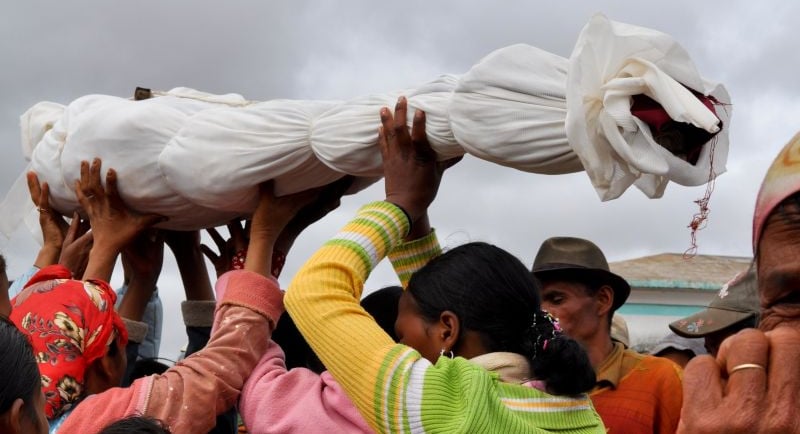Madagascar's Unique Funeral Culture: From Taboo to Turning the Bones
Madagascar's funeral traditions are a fascinating blend of ancestor worship, intricate taboos, and unique rituals like the "turning of the bones," showcasing a deep reverence for the dead and their ongoing connection to the living.
12/7/20242 min read


Madagascar's Unique Funeral Culture: From Taboo to Turning the Bones
Madagascar’s funeral customs are among the most fascinating in the world, blending rich traditions, ancestor worship, and unique rituals. This blog explores the culture, taboos, and ceremonies surrounding death in Madagascar, offering a glimpse into how the Malagasy honor their departed loved ones.
Madagascar: A Cultural Overview
Madagascar, an island nation off the southeastern coast of Africa, has a unique identity shaped by influences from Indonesia and France. With a population of nearly 31 million, most Malagasy people adhere to traditional ancestor worship, while almost half also practice Christianity.
The island's rural lifestyle influences its culture significantly, with 80% of the population living in rural areas where life expectancy is relatively low (66 years for men and 69 for women). Despite the challenges, the Malagasy maintain a rich tapestry of traditions rooted in respect for their ancestors.
The Role of Taboos (Fady)
In Madagascar, fady are taboos or sacred rules that govern daily life and are deeply respected. These taboos vary between villages and often influence behavior, diet, and rituals. Examples include:
Avoiding pointing at graves.
Pregnant women refraining from eating eels.
The prohibition of hunting certain animals due to spiritual beliefs.
Breaking a fady is seen as a spiritual transgression that can disrupt community balance, leading to shunning or other repercussions. These taboos also extend to funeral customs, shaping how the deceased are honored.
Funeral Customs in Madagascar
Funerals in Madagascar are deeply rooted in ancestor worship. While customs vary between ethnic groups, they share a common goal: ensuring the deceased are at peace and able to bestow blessings upon the living.
Burial Practices
Eastern Madagascar: If a young person dies unexpectedly, their death may be attributed to witchcraft, delaying their burial for months.
Mahafaly Region: Tombs are decorated with zebu horns and carved wooden posts (aloalo) symbolising respect for the deceased.
Sakalava People: Burial sites feature wood carvings and sculptures representing balance and fertility.
The belief that only those who receive proper funerals can become ancestors underscores the importance of these traditions.
Famadihana: Turning of the Bones
One of Madagascar’s most renowned rituals is famadihana, or the "turning of the bones." Held every 5-7 years, this ceremony involves exhuming the deceased to rewrap them in fresh cloth and reconnect with their family.
The event is a celebration filled with music, dancing, and speeches, reinforcing family bonds and keeping the memories of ancestors alive. The deceased are even carried around their tombs to familiarize them with their resting place.
Watch Our Full Video
Learn more about Madagascar’s fascinating funeral culture by watching our video:
Health Risks and Modern Challenges
While famadihana is a cherished tradition, it poses significant health risks. Madagascar is one of the few places where the plague persists, and exhuming infected bodies can lead to outbreaks.
Efforts to educate the population about these risks, combined with shifting attitudes among younger Malagasy, have led to a gradual decline in this practice. Many now seek safer ways to honor their ancestors while preserving their cultural heritage.
Honoring Tradition While Embracing Change
Madagascar’s funeral customs reflect a deep respect for ancestors and a desire to maintain strong family connections. As the nation navigates the balance between tradition and modernity, its cultural richness remains a testament to the resilience of its people.
If you have questions or If this topic resonates with you, we encourage you to explore more about navigating grief and end-of-life challenges. Remember, you’re not alone in this journey, book a consultation below.

